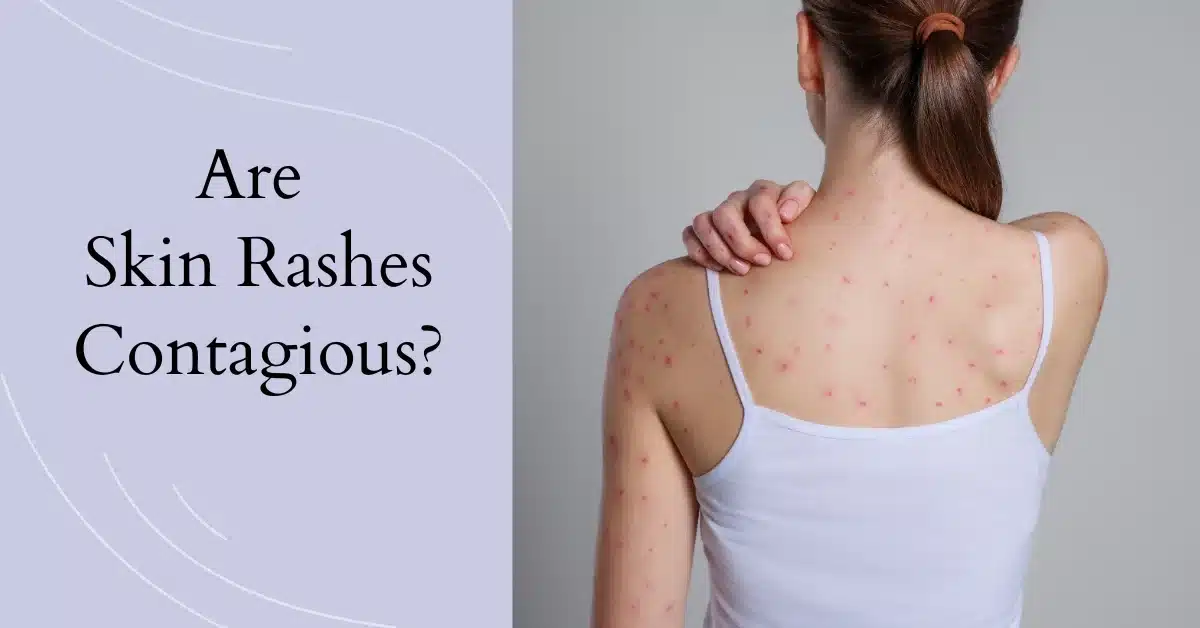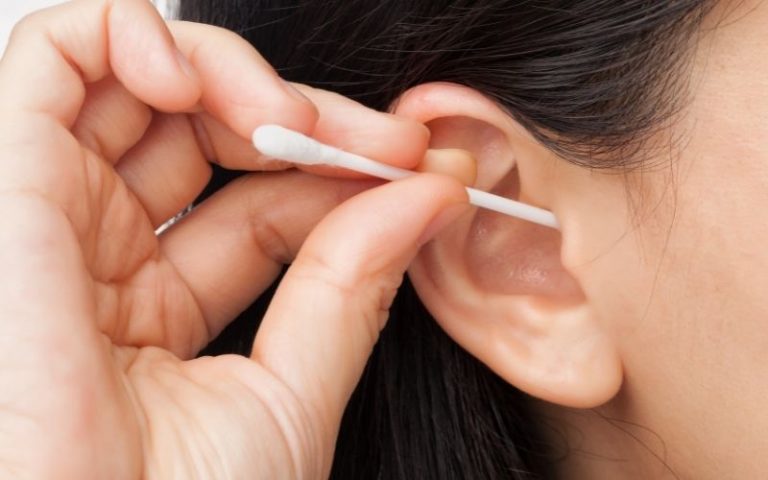Behind The Blotches: Are Skin Rashes Contagious?

Ever glanced at a sudden red blotch on your skin and wondered, “Is this just a passing itch or something I should be worried about sharing with others?” We’ve all been there, and it’s not just the itchiness that bothers us; it’s the swirling questions about its origin and contagiousness.
In our day-to-day lives, our skin, the magnificent barrier and largest organ, encounters countless environmental agents and irritants. Sometimes, these encounters lead to unsolicited red guests on our skin – rashes! But the million-dollar question is: are these rashes just temporary blemishes, or could they be potentially infectious nightmares waiting to spread?
Well, fret not! We’re here to guide you through the labyrinth of skin rashes, demystify the myths, and offer clarity on which rashes you should be cautious about. Whether you’re a concerned parent, a cautious co-worker, or just someone with an insatiable curiosity about the human body, this guide is for you. So, buckle up, and let’s embark on this skin-deep journey together!
Table Of Contents
- Understanding The Causes Of Contagious Skin Rashes
- Contagiousness Of Different Types Of Skin Rashes
- How Skin Rashes Spread
- Prevention And Precaution Of Contagious Skin Rashes
- List Of Contagious And Non-Contagious Skin Rashes
- Clarifying Various Other Details
- The Bottom Line
Understanding The Causes Of Contagious Skin Rashes
When confronted with a skin rash, it’s natural to seek answers. While many rashes are benign, some have the potential to spread and can be the result of underlying bacterial, viral, fungal, or parasitic causes. For instance, bacteria can lead to conditions like impetigo, while certain viruses are responsible for outbreaks like cold sores. Fungi often cause issues like ringworm, and then there are mites that bring about conditions such as scabies.
Our skin, the body’s largest organ, acts as a protective barrier against various external elements. While it does a fantastic job most of the time, there are occasions when certain invaders breach this defense and cause various types of skin rashes. Not all rashes are created equal, and while some are merely reactions or irritations, others can be contagious and spread from one person to another.
Having a grasp on the causes helps not only in effective management but also in prevention. It’s always wise to consult a dermatological expert when facing uncertain skin concerns. Your skin’s health is paramount; understanding its signals is the first step toward care.
Contagiousness Of Different Types Of Skin Rashes
When we hear the word “contagious,” our minds often jump to severe conditions. But in dermatology, “contagious” can mean anything from a simple cold sore to more concerning ailments.
The contagiousness of skin rashes varies widely based on the underlying cause and the mode of transmission of the infectious agent.
- Viral rashes, such as those caused by the measles virus or the herpes simplex virus, tend to be highly contagious. These viruses can spread through close personal contact, respiratory droplets, and even by touching contaminated surfaces.
- Bacterial rashes, like those caused by Streptococcus or Staphylococcus bacteria, can also be contagious. These bacteria can penetrate the body via cuts, abrasions, or even healthy skin, causing infections that manifest as rashes. For instance, streptococcal bacteria can lead to conditions like impetigo, characterized by red sores that can burst and ooze.
- Fungal rashes, like ringworm or athlete’s foot, are also contagious. These fungi flourish in humid and warm conditions, making them common in places like locker rooms and swimming pools. They can transmit via direct touch with an infected individual or by touching surfaces contaminated with the fungi.
On the other hand, rashes caused by non-infectious factors, such as allergic reactions or irritants, are not contagious. These rashes are the body’s response to specific triggers and do not involve the presence of infectious agents.
Remember, the key is always to consult a dermatologist or doctor when in doubt.
How Skin Rashes Spread
Skin rashes can spread in various ways, depending on their origin (bacterial, viral, fungal, or parasitic). Understanding the mechanism of transmission is essential for prevention. Here’s a breakdown of how different types of rashes spread:
- Direct Contact: Many rashes spread through skin-to-skin contact with an infected person. Examples include impetigo, ringworm, scabies, and herpes simplex.
- Indirect Contact: Some rashes can spread by touching objects or surfaces an infected person has touched, such as clothing, towels, or bedding. Fungal infections like athlete’s foot can spread this way.
- Airborne Transmission: Diseases like chickenpox and measles can spread through the air when a person with the infection coughs or sneezes.
- Vector Transmission: Some rashes, like those caused by Lyme disease, spread through insect bites.
Prevention And Precaution Of Contagious Skin Rashes
Preventing the spread of contagious skin rashes requires a combination of awareness and proactive measures. Here are some practical tips to help prevent transmission:
- Personal Hygiene: It’s vital to wash hands thoroughly with soap and water for at least 20 seconds. Moreover, refrain from touching the face, particularly the eyes, nose, and mouth, without first cleaning your hands.
- Avoid Direct Contact: Stay away from people or animals known to have contagious skin infections.
- Clean and Cover Wounds: Open sores or breaks in the skin can become portals for bacteria. Maintain the wounds clean, dry, and covered with a sterile bandage.
- Vaccination: Ensure that you and your family are up-to-date with vaccinations. Some vaccines, like those for chickenpox or measles, can prevent specific viral rashes.
- Use Personal Items: Avoid sharing personal items like towels, shoes, razors, or hairbrushes.
- Wear Footwear in Communal Areas: Always wear sandals or flip-flops in public showers, pools, and locker rooms to prevent fungal infections.
- Practice Safe Sex: Utilize condoms or dental dams to minimize the likelihood of contracting sexually transmitted infections that can cause rashes, like herpes or syphilis.
- Use Insect Repellent: In areas where ticks or mosquitoes are prevalent, use an effective insect repellent and wear appropriate clothing.
- Stay Informed: If there’s an outbreak of a contagious skin condition in your community or school, be aware and take necessary precautions.
- Seek Medical Advice: Consult a healthcare professional if you believe you have a contagious rash. Prompt identification typically results in more successful therapy and lowers the chance of transmitting the ailment to others.
Remember, while some skin rashes are just a minor annoyance, others can indicate a more severe condition or lead to complications if not treated. Being proactive in prevention and seeking timely medical advice is always the best approach.
List Of Contagious And Non-Contagious Skin Rashes
Here’s a quick rundown of contagious and non-contagious skin rashes:
Contagious Skin Rashes
- Ringworm (Tinea): Despite its name, it’s a fungal infection and not caused by a worm.
- Impetigo: A bacterial skin infection that causes red sores on the face, especially around the nose and mouth.
- Scabies: Caused by tiny mites that burrow into the skin.
- Herpes Simplex: This includes cold sores (oral herpes) and genital herpes.
- Chickenpox (Varicella): A viral infection characterized by itchy, red spots.
- Shingles (Herpes Zoster): Caused by the same virus as chickenpox; contagious to those who haven’t had chickenpox or the vaccine.
- Molluscum Contagiosum: A viral skin infection that leads to raised, pearl-like nodules on the skin.
- Athlete’s Foot (Tinea Pedis): A fungal infection that affects the feet.
- Jock Itch (Tinea Cruris): Fungal infection of the groin and thighs.
Non-Contagious Skin Rashes
- Eczema (Atopic Dermatitis): Chronic skin condition causing dry, itchy patches.
- Psoriasis: Chronic autoimmune condition causing thick, scaly skin patches.
- Contact Dermatitis: Resulting from skin contact with an irritant or allergen.
- Heat Rash (Miliaria): Blocked sweat ducts lead to red bumps, usually due to overheating.
- Hives (Urticaria): Red, itchy welts that arise due to an allergic reaction or other triggers.
- Rosacea: A chronic skin condition leading to facial redness and sometimes small, pus-filled bumps.
- Seborrheic Dermatitis: Causes flaky patches of skin, usually on the scalp.
- Drug Rashes: Rashes that appear as a reaction to medications.
- Stasis Dermatitis: A skin irritation on the lower legs, generally related to circulatory problems.
If you suspect any of these rashes, you must see a dermatologist or medical professional for a correct diagnosis and appropriate treatment.
Clarifying Various Other Details
Sometimes topics can get a tad complex, right? Let’s dive a bit deeper to ensure we’re all on the same page. It’s like a mini-guide to ensure we get a clearer picture and understanding together. Ready to unravel the nuances?”
Are Viral Rashes Contagious?
Absolutely! Viral rashes, as the name suggests, are caused by viruses. Examples include measles, chickenpox, and shingles. These rashes can spread through direct skin contact, respiratory droplets, or contaminated objects. The good news? Vaccinations can prevent many of them. And while the rash itself might be unsettling, remember it’s the virus causing the rash that’s contagious.
Are Heat Rashes Contagious?
Ah, the bane of summer! Heat rashes, often called prickly heat, arise when sweat ducts get blocked and swell up. But here’s the comforting part – they’re not contagious. They’re just your skin’s grumpy response to humidity and high temperatures. Keep the area cool, avoid excessive sweating, and you’ll be just fine!
Are Allergy Rashes Contagious?
Allergic reactions can lead to rashes that look alarming. Whether it’s due to a food item, a cosmetic, or pollen, these rashes are your body’s way of sounding an alarm. But rest assured; you can’t “catch” an allergy rash from someone. They’re your immune system’s unique response and aren’t transferable.
Contagious Rashes In Adults: What To Know
While kids often seem like the primary carriers of contagious ailments (ah, the joys of playgrounds and shared crayons!), adults aren’t exempt. Conditions like herpes or athlete’s foot are examples of contagious rashes in adults. It’s essential to maintain good hygiene, avoid sharing personal items, and when in doubt, keep that rash covered!
Is Poison Ivy Rash Contagious?
Let’s clear this up: the rash from poison ivy isn’t contagious. What is contagious, however, is the oil (urushiol) from the plant. If someone has the oil on their skin or clothing and you touch it, you might also get a rash. So, if you’ve been romping around in the woods and spot that notorious’ leaflets of three’, wash everything thoroughly!
Fungal Rashes: Are They Contagious?
Ever heard of an athlete’s foot or jock itch? These are caused by fungi, and yes, they’re contagious. Fungi love warm, moist environments – think public showers or gym floors. So, if you frequent such places, always wear footwear and avoid sharing towels. And, if you have a fungal rash, treat it promptly to prevent it from spreading.
The Bottom Line
Understanding the contagious nature of skin rashes is crucial for safeguarding our health and the health of those around us. Not all rashes are contagious, and their transmission mechanisms are diverse. Viral, bacterial, and fungal rashes spread through different routes, highlighting the importance of preventive measures such as good hygiene, avoiding close contact, and proper isolation.
Seeking medical advice, practicing good hygiene, and staying informed about the transmission mechanisms are our best tools in curbing the spread of contagious skin rashes and fostering healthier, well-informed communities.
FAQs
Q: What causes contagious skin rashes?
A: Contagious skin rashes can be caused by bacteria, viruses, fungi, or parasites.
Q: How can I identify a contagious rash versus a non-contagious one?
A: Identification usually requires a dermatologist’s expertise. However, contagious rashes might be associated with other symptoms or spread among close contacts.
Q: What are the most common contagious skin rashes?
A: Common contagious rashes include ringworm, impetigo, scabies, and herpes simplex.
Q: How are contagious skin rashes transmitted from person to person?
A: Transmission can occur through direct skin-to-skin contact, sharing personal items, airborne droplets, or contact with contaminated surfaces.
Q: What preventive measures can I take to avoid catching a contagious rash?
A: Maintain good hygiene, avoid close contact with infected individuals, and don’t share personal items. Wash hands frequently and use antifungal or antibacterial products when advised.
Q: How long does a contagious rash remain infectious?
A: This varies by rash. For instance, chickenpox is infectious until all blisters have crusted over, while scabies remains contagious until after treatment.
Q: Can adults and children get the same contagious rashes?
A: Yes, both adults and children can contract the same contagious rashes, but some rashes, like chickenpox, are more common in children.
Q: What treatments are recommended for contagious skin rashes?
A: Treatments depend on the cause: bacterial rashes might need antibiotics, fungal rashes antifungals, viral rashes antiviral meds, and parasitic rashes specific treatments like scabicides.
Q: Are all itchy rashes considered contagious?
A: No, not all itchy rashes are contagious. Eczema and allergic reactions, for instance, are itchy but not contagious.
Q: How soon should I see a dermatologist if I suspect my rash is contagious?
A: It’s best to consult a dermatologist or primary care physician immediately if you suspect a contagious rash for your well-being and to prevent spreading it to others.
References
https://www.emedicinehealth.com/are_skin_rashes_contagious/article_em.htm
https://www.webmd.com/skin-problems-and-treatments/ss/slideshow-contagious-rashes
https://www.healthline.com/health/contagious-skin-rashes
https://www.medicinenet.com/are_skin_rashes_contagious/article.htm
https://www.icliniq.com/articles/infectious-diseases/contagious-skin-rashes
https://thedevonshireclinic.co.uk/are-skin-diseases-contagious/





